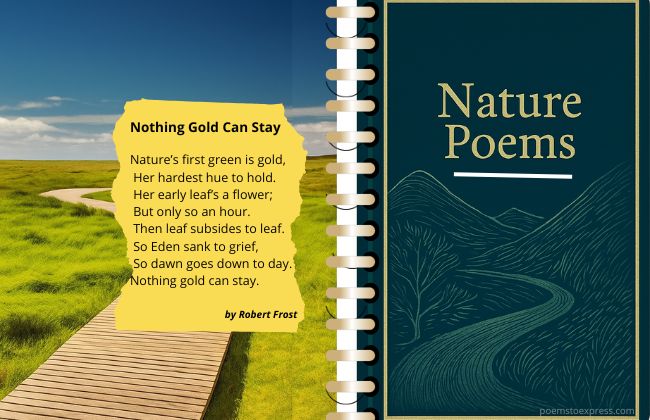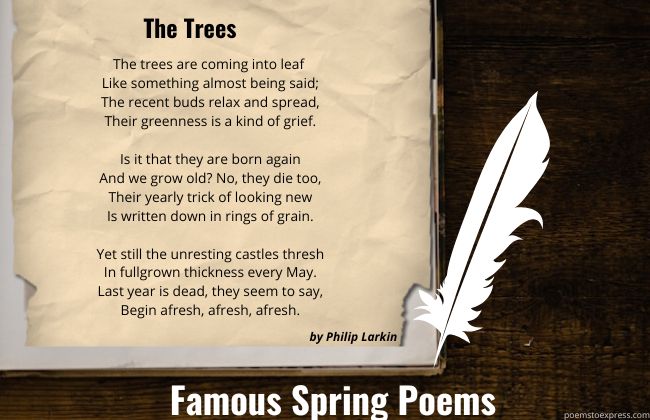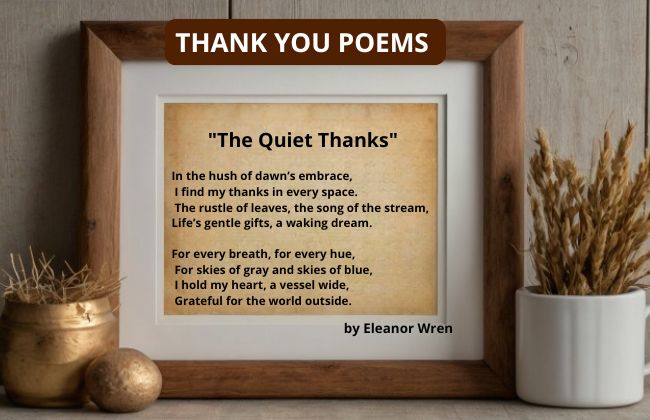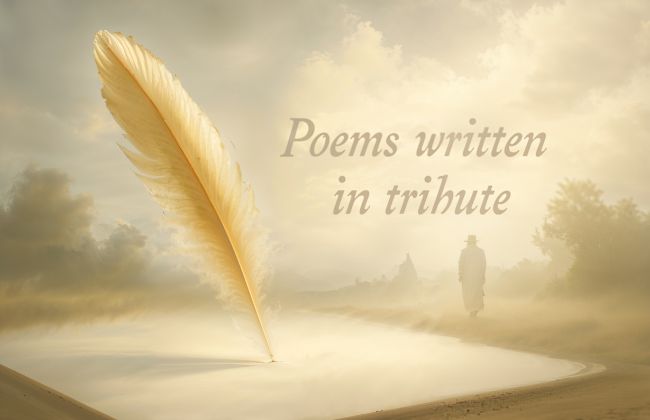In life’s most difficult moments, when words seem insufficient to express the pain of loss, poems rise as a refuge of comfort and tribute.
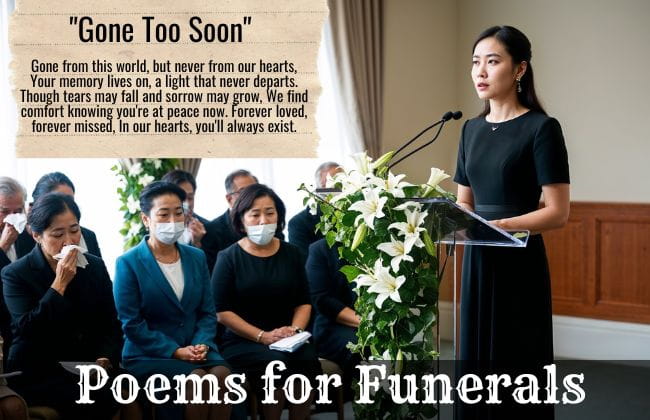
At funerals, poems not only serve to pay homage to those who have departed, but also create a space for connection and empathy among those who remain. They invite us to remember, to mourn, and, above all, to celebrate the life lived.
Throughout history, poets from all cultures have explored the theme of death, leaving us a legacy of works that comfort, heal, and celebrate the life that was.
These funeral poems not only honor those who have left us but also offer comfort to the living, inviting us to reflect on the ephemeral beauty of our existence.
We invite you to delve into this selection of poems for funerals, hoping that you find in them a reflection of your feelings and a comfort in your time of loss.”
Table of Contents
- 1 1) “Do Not Stand at My Grave and Weep” by Mary Elizabeth Frye
- 2 2) “Farewell” by Anne Brontë
- 3 3) “Remember” by Christina Rossetti
- 4 4) “Crossing the Bar” by Alfred Lord Tennyson
- 5 5) “Funeral Blues” by W.H. Auden
- 6 6) “Peace” by Henry Vaughan
- 7 7) ‘No Time’ by Billy Collins
- 8 8) “To an Athlete Dying Young” by A.E. Housman
- 9 9) ‘Death, be not proud’ by John Donne
- 10 10) “If I Should Go” by Joyce Grenfell
- 11 Understanding the Role of Poetry in Funerals
- 12 Choosing the Right Poem for a Funeral
1) “Do Not Stand at My Grave and Weep” by Mary Elizabeth Frye
Written in 1932, the poem stretches across time to offer solace to those grieving a loss. Its message is straightforward yet profound: the essence of a loved one does not disappear with their physical departure.
Within the stanzas, natural imagery serves as metaphors for the ongoing spirit of the deceased, assuring mourners that their loved one is still with them in the world around them.
This poem remains a poignant choice for those seeking to celebrate the continuity of life and spirit at funerals.
Do not stand at my grave and weep
I am not there. I do not sleep.
I am a thousand winds that blow.
I am the diamond glints on snow.
I am the sunlight on ripened grain.
I am the gentle autumn rain.
When you awaken in the morning's hush
I am the swift uplifting rush
Of quiet birds in circled flight.
I am the soft stars that shine at night.
Do not stand at my grave and cry;
I am not there. I did not die.
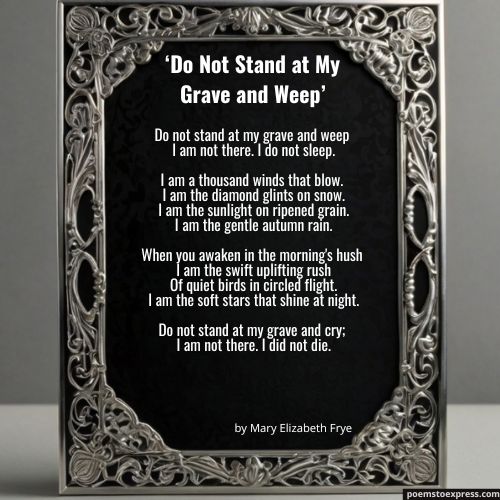
2) “Farewell” by Anne Brontë
“Farewell” by Anne Brontë is a poignant poem often read at funerals to evoke the deep emotions associated with parting.
Brontë’s mastery of language and form is evident as she employs a structured rhyme scheme to articulate the sorrow of goodbye. The poem captures the essence of longing and the bittersweet memories of a loved one now gone.
Its verses convey a deep sense of personal loss, while simultaneously offering comfort in the form of cherished memories.
Farewell to thee! but not farewell
To all my fondest thoughts of thee:
Within my heart they still shall dwell;
And they shall cheer and comfort me.
O, beautiful, and full of grace!
If thou hadst never met mine eye,
I had not dreamed a living face
Could fancied charms so far outvie.
If I may ne'er behold again
That form and face so dear to me,
Nor hear thy voice, still would I fain
Preserve, for aye, their memory.
That voice, the magic of whose tone
Can wake an echo in my breast,
Creating feelings that, alone,
Can make my tranced spirit blest.
That laughing eye, whose sunny beam
My memory would not cherish less; --
And oh, that smile! whose joyous gleam
Nor mortal language can express.
Adieu, but let me cherish, still,
The hope with which I cannot part.
Contempt may wound, and coldness chill,
But still it lingers in my heart.
And who can tell but Heaven, at last,
May answer all my thousand prayers,
And bid the future pay the past
With joy for anguish, smiles for tears?
3) “Remember” by Christina Rossetti
Written in 1849 when Rossetti was only 19, it transcends time as a poignant piece frequently chosen for funerals. Through its touching verses, the speaker expresses a desire to be remembered after passing away yet also implores their loved one to find peace should memory fade.
The poem’s structure and the heartfelt plea it contains find resonance with those grieving, providing comfort during life’s most trying times.
Notably, the poet’s language conveys a deep emotional truth about the human desire to be held in memory, serving as a bridge between the living and those who have departed.
Remember me when I am gone away,
Gone far away into the silent land;
When you can no more hold me by the hand,
Nor I half turn to go yet turning stay.
Remember me when no more day by day
You tell me of our future that you planned:
Only remember me; you understand
It will be late to counsel then or pray.
Yet if you should forget me for a while
And afterwards remember, do not grieve:
For if the darkness and corruption leave
A vestige of the thoughts that once I had,
Better by far you should forget and smile
Than that you should remember and be sad.

4) “Crossing the Bar” by Alfred Lord Tennyson
The poem is Tennyson’s poignant reflection on death, encapsulated in the metaphor of a sea journey and the crossing of a sandbar to face the afterlife. The imagery of the sea and the setting sun are powerful elements used to suggest a final voyage from life into the unknown.
The narrative voice of the poem expresses a calm acceptance of death, anticipating the meeting with the ‘Pilot’, a euphemism for God, after his departure.
The poem’s structure, consisting of four quatrains with an ABAB rhyme scheme, offers a sense of harmony and order, mirroring the speaker’s serene approach to the end of his life’s journey.
Sunset and evening star,
And one clear call for me!
And may there be no moaning of the bar,
When I put out to sea,
But such a tide as moving seems asleep,
Too full for sound and foam,
When that which drew from out the boundless deep
Turns again home.
Twilight and evening bell,
And after that the dark!
And may there be no sadness of farewell,
When I embark;
For tho’ from out our bourne of Time and Place
The flood may bear me far,
I hope to see my Pilot face to face
When I have cross’d the bar.
5) “Funeral Blues” by W.H. Auden
“Festival Blues” is a moving piece by W.H. Auden that captures the profound sense of loss experienced after the passing of a loved one.
Originally written for a play in 1936, the poem gained a life of its own, striking a chord with readers who found solace in its raw emotional power.
The poem is structured into four quatrains and utilizes a traditional AABB rhyme scheme, which adds to its solemn and rhythmic quality. Auden’s use of imagery—such as ‘stopping the clocks’ and ‘muffling the drum’—conveys the desire to halt time and express the gravity of mourning.
Its vivid emotional expression allows mourners to acknowledge their pain and commemorate the significance of the lost life.
Stop all the clocks, cut off the telephone,
Prevent the dog from barking with a juicy bone,
Silence the pianos and with muffled drum
Bring out the coffin, let the mourners come.
Let aeroplanes circle moaning overhead
Scribbling on the sky the message 'He is Dead'.
Put crepe bows round the white necks of the public doves,
Let the traffic policemen wear black cotton gloves.
He was my North, my South, my East and West,
My working week and my Sunday rest,
My noon, my midnight, my talk, my song;
I thought that love would last forever: I was wrong.
The stars are not wanted now; put out every one,
Pack up the moon and dismantle the sun,
Pour away the ocean and sweep up the wood;
For nothing now can ever come to any good.
6) “Peace” by Henry Vaughan
Written in the mid-17th century, Vaughan’s profound faith is intricately woven into his verse, showcasing his talent for merging spiritual fervor with poetic expression.
The poem is often lauded for its tranquility and serene depiction of the afterlife, making it a fitting choice for funerals.
In “Peace,” Vaughan conjures a pastoral and mystical landscape where the soul encounters solace, far removed from earthly tumult and strife.
The imagery of a country “Afar beyond the stars” invites mourners to envision a peaceful and heavenly realm. The reference to one “born in a manger” is a clear nod to Christian beliefs, offering comfort in the idea of Jesus Christ as a symbol of ultimate peace and eternal life.
This piece provides a sense of consolation and hope to those grieving, by portraying death as a gentle passage to a divine sanctuary.
My Soul, there is a country
Afar beyond the stars,
Where stands a winged sentry
All skillful in the wars;
There, above noise and danger
Sweet Peace sits, crown’d with smiles,
And One born in a manger
Commands the beauteous files.
He is thy gracious friend
And (O my Soul awake!)
Did in pure love descend,
To die here for thy sake.
If thou canst get but thither,
There grows the flow’r of peace,
The rose that cannot wither,
Thy fortress, and thy ease.
Leave then thy foolish ranges,
For none can thee secure,
But One, who never changes,
Thy God, thy life, thy cure.
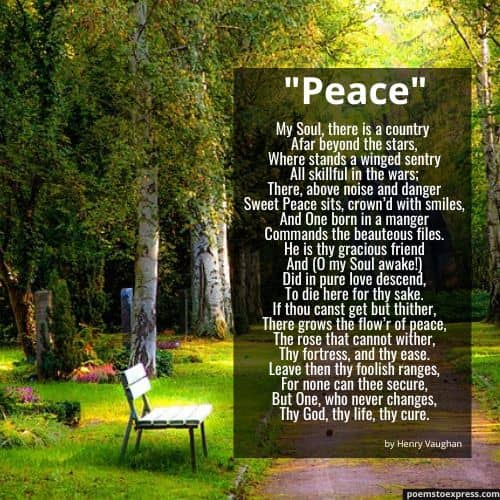
7) ‘No Time’ by Billy Collins
The poem addresses the continuous influence of those who have passed on the living, capturing the duality of presence and absence.
In moments of haste and daily life, the poem suggests how memories of loved ones can suddenly surface, prompting internal reflections.
The act of passing by the cemetery symbolizes a brief yet significant moment of connection with those who have gone, underscoring that, although time presses on, the impact of past relationships remains vibrant and present in our lives.
This poem offers comfort by recognizing these moments of remembrance as a natural and valuable part of the human experience.
In a rush this weekday morning,
I tap the horn as I speed past the cemetery
where my parents are buried
side by side beneath a slab of smooth granite.
Then, all day, I think of him rising up
to give me that look
of knowing disapproval
while my mother calmly tells him to lie back down.
8) “To an Athlete Dying Young” by A.E. Housman
A.E. Housman’s poem “To an Athlete Dying Young” captures the ephemeral nature of fame and the poignant grace found in an athlete’s untimely death.
Written as part of his larger work, “A Shropshire Lad,” it reflects on themes of youth, glory, and the transient nature of life. The poet utilizes a melancholy tone to express the complex emotions surrounding the athlete’s early departure.
The structure of the poem is meticulously crafted, with each stanza contributing to a reflection on mortality and remembrance. It is a poignant inclusion for a funeral, resonating with those who feel the sting of premature loss, yet offering solace through the idea of enduring legacy.
The time you won your town the race
We chaired you through the market-place;
Man and boy stood cheering by,
And home we brought you shoulder-high.
Today, the road all runners come,
Shoulder-high we bring you home,
And set you at your threshold down,
Townsman of a stiller town.
Smart lad, to slip betimes away
From fields where glory does not stay,
And early though the laurel grows
It withers quicker than the rose.
Eyes the shady night has shut
Cannot see the record cut,
And silence sounds no worse than cheers
After earth has stopped the ears.
Now you will not swell the rout
Of lads that wore their honours out,
Runners whom renown outran
And the name died before the man.
So set, before its echoes fade,
The fleet foot on the sill of shade,
And hold to the low lintel up
The still-defended challenge-cup.
And round that early-laurelled head
Will flock to gaze the strengthless dead,
And find unwithered on its curls
The garland briefer than a girl’s.
9) ‘Death, be not proud’ by John Donne
The poem “Death, be not proud” by John Donne directly confronts death, challenging its power and redefining its meaning from a Christian perspective that views death not as an end but as a passage to eternal life.
Donne personifies death, speaking to it directly to undermine its feared image, arguing that it is merely a “short sleep” after which souls awaken to immortality.
The poem offers comfort and a powerful affirmation of hope, emphasizing that death is not the end but a transition to a more glorious and eternal existence.
Death, be not proud, though some have called thee
Mighty and dreadful, for thou art not so;
For those whom thou think'st thou dost overthrow
Die not, poor Death, nor yet canst thou kill me.
From rest and sleep, which but thy pictures be,
Much pleasure; then from thee much more must flow,
And soonest our best men with thee do go,
Rest of their bones, and soul's delivery.
Thou art slave to fate, chance, kings, and desperate men,
And dost with poison, war, and sickness dwell,
And poppy or charms can make us sleep as well
And better than thy stroke; why swell'st thou then?
One short sleep past, we wake eternally
And death shall be no more; Death, thou shalt die.
10) “If I Should Go” by Joyce Grenfell
Joyce Grenfell, known for her abilities as an English actress, comedienne, and writer, captures a poignant perspective on departure.
The poem gently instructs the living to continue on as they were before the loss, to maintain the natural order of life unmarred by exaggerated displays of grief.
The essence of Grenfell’s work lies in its simplicity and the comfort it offers. Readers are encouraged to accept the inevitability of parting while remembering to embrace life.
This poem is often chosen for funerals due to its secular nature and positive outlook, as it provides solace without drawing on religious themes.
If I should die before the rest of you,
Break not a flower nor inscribe a stone.
Nor, when I'm gone, speak in a Sunday voice,
But be the usual selves that I have known.
Weep if you must,
Parting is hell.
But life goes on,
So........ sing as well.
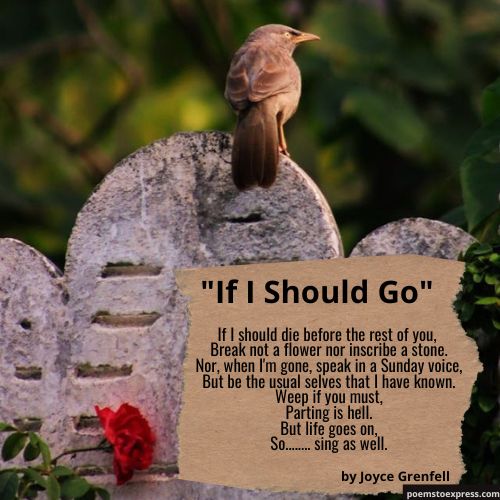
Understanding the Role of Poetry in Funerals
The Emotional Impact of Poems
Poetry during funeral services carries a distinct ability to convey the depth of sorrow and the pangs of loss.
The right choice of words within a poem can reflect the life and essence of the departed, offering mourners a voice when their own may falter.
Poems articulate emotions that the bereaved might struggle to express on their own, thus making poetry a powerful medium for capturing the multitude of feelings that accompany a loss.
- Articulation of Grief: Poems give shape to grief, helping family and friends to navigate their emotional journey.
- Celebration of Life: Through evocative imagery and language, poems can celebrate the personality and legacy of the deceased.
- Comfort and Consolation: The shared experience of a poem read aloud can serve as a collective embrace, wrapping mourners in comfort.
Choosing the Right Poem for a Funeral
1. Reflecting the Deceased’s Personality
When choosing a funeral poem, it is vital to consider poems that resonate with the character and essence of the departed.
One may opt for a poem that encapsulates their spirit, be it a verse filled with humor and wit for someone who was the life of the party, or perhaps a serene and nature-inspired piece for an individual who found solace in the outdoors.
- For a jovial personality: Poems that include themes of cherished memories, laughter, and joy.
- For a reflective soul: Verse that captures introspection, wisdom, and the quiet impact they had on the world.
2. Cultural and Religious Considerations
It’s also crucial to respect the deceased’s cultural and religious affiliations with the chosen poem.
Each culture and religion might hold specific verses and styles that carry deep significance, offering comfort and connection during the service.
- Christian services often integrate biblical Psalms or hymns that provide solace and speak of eternal life.
- In Eastern traditions, writings that ponder on the cyclical nature of life and death are revered.
You might also like:

